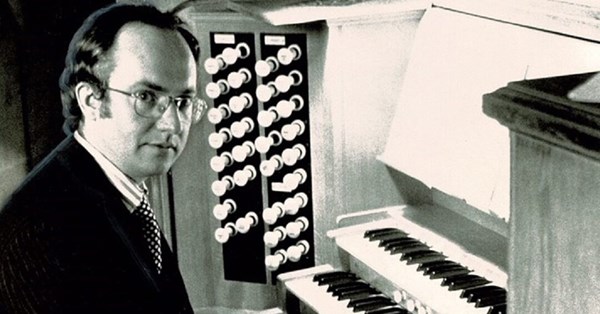Kenneth Shenton writes:
IT WAS perhaps no surprise that, as a former Organist and Assistant Master of the Music at Westminster Cathedral, Nicolas Kynaston, who died on 26 March, aged 83, thought on a grand scale.
He became a significant presence on the international music scene, and enjoyed success as both a concert and recording artist and a hugely influential teacher. It was undoubtedly his broad sweeping readings of the big romantic organ works of the late 19th and early 20th centuries — Vierne, Alain, Liszt, Langlais, Widor, Reger, Franck, Duruflé, and Messiaen — that formed the bedrock of his longstanding reputation
Born in Morebath, Devon, on 10 December 1941, Nicolas Kynaston was the youngest of seven children of Roger Kynaston, a painter and one-time Anglican priest, and his wife, Jessie, a violinist. Music was an integral part of his childhood; he learnt the piano and French horn before, aged eight, he became a chorister, at Westminster Cathedral. During his six years there, he studied the organ with George Malcolm and Maxwell Fernie, studying at Downside with Roger Bevan.
Aged 16, he moved to Italy, where his teacher at both the Accademia Musicale Chigiana, in Sienna, and the Conservatorio Santa Cecilia, in Rome, was Fernando Germani.
He returned to England in 1960, with a scholarship to the Royal College of Music, and Ralph Downes now his mentor. The next year, he was appointed to the vacant post of Organist of Westminster Cathedral. While there, he successfully revived the cathedral’s summer series of celebrity rectials, hosting many of the great names of the time, including Fernando Germani, Langlais, and Cochereau.
In 1966, he made the first of many appearances at the once hugely popular 5.55 p. m. midweek recitals at the Royal Festival Hall. It was there in 1976 that he gave the world première of Lennox Berkeley’s Fantasia for Organ Op. 92. A quarter of a century later, he served on the consultants’ committee, advising on the redesign of the organ chamber, and was one of the soloists chosen to celebrate the instrument’s 50th birthday in 2004.
Relinquishing his Westminster post in 1971, Kynaston travelled widely, giving recitals all around the world. He first visited Greece for the 1965 Athens Festival and later served as Organist of the Athens Concert Hall. Tours further afield took him to exotic locations, including the famous bamboo organ of La Piñas in the Philippines. Annual visits to Germany were interspersed by six coast-to-coast tours of North America. Concerto performances included Bossi in Singapore, Poulenc with the Ulster Orchestra, and six performances of Joseph Jongen’s Symphonie Concertante with the Belgian National Orchestra in various Swiss cities.
Kynaston made his recording debut in 1968; a subsequent Classics for Pleasure recording won him an EMI award for sales exceeding 100,000 in barely 12 months. It remained a bestseller for the next 20 years. His recording of Bach from Clifton Cathedral was nominated for Best Solo Record of the Year by the Music Trades Association, and he received a coveted Deutscher Schallplattenpreis for his recording in Germany of Louis Verne’s Sixth Symphony. More unusual was his contribution to Leopold Stokowski’s recording in Westminster Cathedral of Andrzej Panufnik’s 33-minute choral palindrome, Universal Prayer, for four soloists, choir, three harps, and organ.
He increasingly became the artist of choice to perform the opening recital on new instruments. These included Ingolstadt Münster, Zurich Tonhalle, and the Singapore Concert Hall. Back home, he served as artistic adviser to the English organ builder J. W. Walker & Sons from 1978 until 1982, and played a pivotal part in their new instruments for both University College School, in north London, and St Chad’s RC Cathedral, Birmingham. Further instruments to benefit from his expertise included those at Bristol Cathedral, Tewkesbury Abbey, Bath Abbey, and Rugby School. He was also responsible for the newly built instrument for the Halle Concert Hall, opened in 2000.
As a much sought-after teacher, Kynaston’s contribution has been immense. Associated with both Oxford and Cambridge universities, he was also Professor of Organ at the Royal Academy of Music, from 2002 until 2014. Throughout his career, his outstanding credentials also found a ready outlet as a keynote contributor to masterclasses, seminars, and workshops worldwide. Likewise, he was also in regular demand as an international adjudicator, and was the first English organist to be invited to serve on the jury of the Grand Prix de Chartres.
In 1976, he was elected an honorary fellow of the Royal College of Organists, and in 1983, he succeeded Dame Gillian Weir as President of the Incorporated Association of Organists. He was an occasional editor and transcriber of music for organ and chaired both the National Organ Teachers’ Encouragement Scheme and, from 1997 to 2000, the Association of Independent Organ Advisers. In 2019, he was awarded the RCO Medal.
Twice married, Kynaston is survived by two sons and two daughters from his first marriage.
















